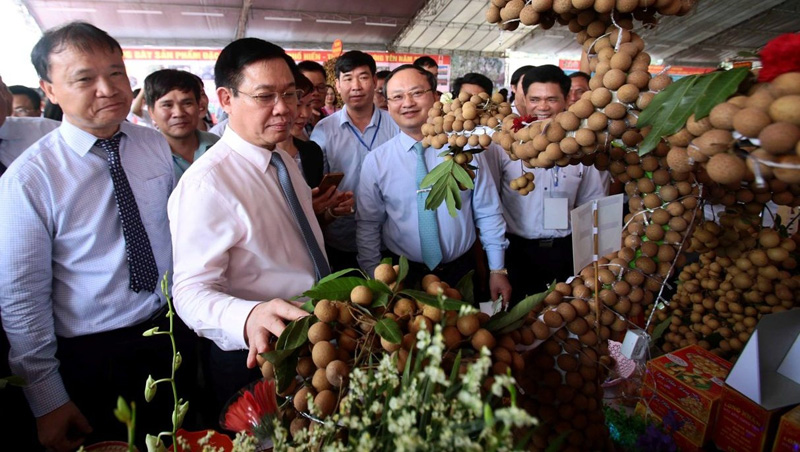


|
Deputy PM Vuong Dinh Hue visits a pavilion at the conference (photo: VGP) Speaking at the conference in the province with the participation of representatives from Hung Yen, 28 other provinces and city in the north and more than 20 enterprises, the Deputy PM also described the event as a practical and basic solution to promoting the agricultural production and farm produce consumption in a comprehensive way. He took note of Hung Yen’s good growth in agriculture, positive outcomes in the building of new-style rural areas with over 60% of the communes recognised. From a locality receiving subsidies from the central government, Hung Yen has now become self –sufficient and even contributed part of its revenue to the central government’s coffer. The province’s annual growth is recorded at 8.68%, much higher that the country’s average. As for longan, a local specialty, Deputy PM Hue said provincial authorities need to focus on the zoning work and pay heed to the demand from the market. Besides, they should also closely coordinate with other provinces and cities, especially the northern border provinces of Lang Son and Lao Cai, as well as with relevant authorities of China’s localities. Domestic enterprises and distribution groups, together with traditional partners, should join hands to connect the markets and create a stable consumption of the fruit. Besides, negotiations should be conducted for the official export of longan under signed contracts. The Deputy PM also said provincial authorities should focus their attention on building and protecting trademarks, stressing that marketing work must be done well. Chairman of the Hung Yen Peole’s Committee Nguyen Van Phong affirmed that in the time to come, provincial authorities will push up the production of key farm produce of high value, quickly develop production forms, and intensify the linkages in the production, especially for longan. Hung Yen, believed to be the cradle of longan in Vietnam, is now home to over 4,000 ha under the fruit, with more than 3,800 ha yielding about 40,000 tonnes this year. Over the recent past, the fruit has been exported to China and promotion activities conducted so as to bring it to the US, Japan, Australia and the Republic of Korea. |